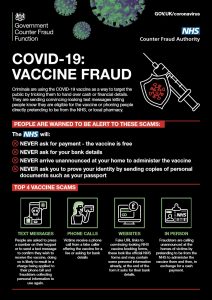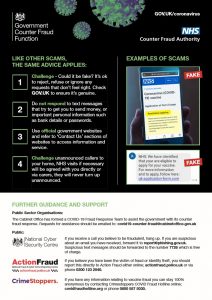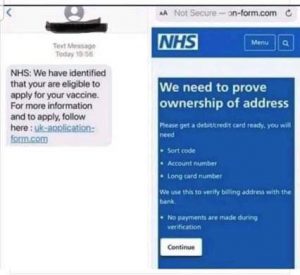Free Food available now for those in need
Stogursey Community Network have taken their first delivery of food stuffs for distribution within the parish to those in need.
Please ring 01278 732149 in confidence if you are in need of assistance.

Stogursey Community Network have taken their first delivery of food stuffs for distribution within the parish to those in need.
Please ring 01278 732149 in confidence if you are in need of assistance.

Please take care and advise any vulnerable people you know not to become a victim of these scams. You can download a pdf copy of this COVID-19 Vaccine Fraud leaflet and a leaflet explaining the vaccine role out is here Covid-19 vaccination – Why do I have to wait? for downloading.


The latest national advice on coronavirus (COVID-19) is available on the Government website and NHS website.
Trading Standards is warning the public to be on their guard following reports that fraudsters are sending out fake texts offering a Covid-19 vaccine in an attempt to steal bank details.

The text offers a link to what police call an “extremely convincing” fake NHS website.
Once on the website people are asked to input their bank details to register for a vaccine.
The scam message reads ‘we have identified that you are eligible to apply for your vaccine’ and then prompts you to click on a link for further information or to ‘apply’ for the vaccine.
If you receive a text or email that asks you to click on a link or for you to provide information, such as your name, credit card or bank details, delete it immediately.
Remember, the NHS will never ask for your payment details.
If you think you have been scammed, you can get advice and find out how to report it at Citizens Advice – What to do if you’ve been scammed.
If you think you have been targeted by a scammer contact Action Fraud on 03001232040

The BBC is helping children keep up with their studies during the latest lockdown, by broadcasting lessons on BBC Two and CBBC, as well as online.
Schools are open only to children of key workers and vulnerable children, with most children now continuing their learning remotely from home.
The BBC will show curriculum-based programmes on TV from Monday.
They will include three hours of primary school programming every weekday on CBBC, and at least two hours for secondary pupils on BBC Two.
During the first lockdown, lessons were available in iPlayer, red button and online, but not on regular TV channels.
The move comes amid concerns that low-income families may struggle to afford data packages for their children to take part in online learning.

We have been informed that the Slinky Bus service, as outlined HERE is still operating during the current lockdown.